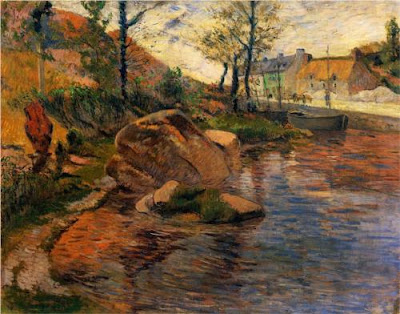There are far too many busybodies abroad in the world. As I have remarked in the past, this is a product of the utopian impulse that has infected humanity in the wake of the so-called "Age of Enlightenment." The busybodies possess a noisome stream of notions about how we ought to live our lives.
The rest of us just want to be left alone.
Repose
Repose is in simplicities.
Perhaps the mind has leaves like trees,
Luxuriant in the sensual sun
And tossed by wind's intricacies,
And finds repose is more than grief
When failing light and falling leaf
Denote that winter has begun.
James Reeves, The Natural Need (1936).
Paul Gauguin, "The Willows" (1889)
For busybodies, everything is an "issue," everything is a problem to be solved. If you do not agree with them, you become a part of the problem. Rest assured: within the soul of every soi-disant "progressive" and "activist" there lurks a totalitarian.
My response to busybodies and their agendas (for them, life is a never-ending series of agendas) is simple.
"Think as I think," said a man,
"Or you are abominably wicked,
You are a toad."
And after I had thought of it,
I said: "I will, then, be a toad."
Stephen Crane, The Black Riders and Other Lines (1895). The poem is untitled.
Paul Gauguin, "Landscape at Pont-Aven" (1886)
The only "problem" that each of us needs to attend to is the state of our own soul. I have yet to encounter a person who has earned the right to tell anybody else how to live their life. What, then, is that sound you hear emanating from busybodies and from their symbiotic overlords and enablers (politicians, social engineers, and media mouthpieces)? Hypocrisy.
Good-bye to all that. I shall join Ernest Dowson in Brittany.
Breton Afternoon
Here, where the breath of the scented-gorse floats through the sun-stained air,
On a steep hill-side, on a grassy ledge, I have lain hours long and heard
Only the faint breeze pass in a whisper like a prayer,
And the river ripple by and the distant call of a bird.
On the lone hill-side, in the gold sunshine, I will hush me and repose,
And the world fades into a dream and a spell is cast on me;
And what was all the strife about, for the myrtle or the rose,
And why have I wept for a white girl's paleness passing ivory!
Out of the tumult of angry tongues, in a land alone, apart,
In a perfumed dream-land set betwixt the bounds of life and death,
Here will I lie while the clouds fly by and delve an hole where my heart
May sleep deep down with the gorse above and red, red earth beneath.
Sleep and be quiet for an afternoon, till the rose-white angelus
Softly steals my way from the village under the hill:
Mother of God, O Misericord, look down in pity on us,
The weak and blind who stand in our light and wreak ourselves such ill.
Ernest Dowson, Decorations: In Verse and Prose (1899).
Paul Gauguin, "The Wooden Gate" (1889)
In due time, of course, we shall attain our ultimate repose and reverie. A busybody-free bourne.
In a Breton Cemetery
They sleep well here,
These fisher-folk who passed their anxious days
In fierce Atlantic ways;
And found not there,
Beneath the long curled wave,
So quiet a grave.
And they sleep well
These peasant-folk, who told their lives away,
From day to market-day,
As one should tell,
With patient industry,
Some sad old rosary.
And now night falls,
Me, tempest-tost, and driven from pillar to post,
A poor worn ghost,
This quiet pasture calls;
And dear dead people with pale hands
Beckon me to their lands.
Ernest Dowson, Ibid.
Paul Gauguin, "Haymaking in Brittany" (1888)












